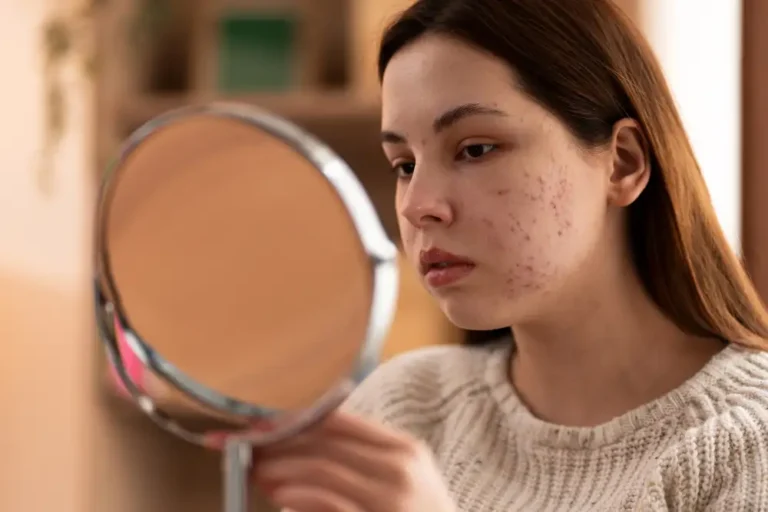The term ‘fungal infection’ refers to the growth of fungi in areas that are hot and humid. While fungi are usually harmless, they can cause infections when exposed to favorable conditions, affecting the skin, nails, and even internal organs. Individuals with immunocompromised health conditions are more prone to such infections. Seeking prompt fungal infection treatment is essential to prevent complications and restore healthy skin.
If you are also troubled with repeated fungal infections and wishing for a sure shot solution, waste no more time and visit Dr. Neha Khuraana at the House of Aesthetics, a specialist in dealing with such infections, giving you the best possible care with her 12 years of experience and empathetic nature.
Types of Fungal Infections
- Superficial Fungal Infections – Such infections usually affect skin, hair, nails or mucous membranes of the body and are less severe. The various kinds of superficial infections include athlete’s foot or tinea pedis affecting the region with the foot toes, ringworm or tinea corporis infesting in the skin, jock itch or tinea cruris in which fungi grow and multiply in the groin areas, the scalp of children getting affected with tinea capitis etc. Another superficial fungal infection is candidiasis affecting the buccal cavity with oral thrush or thr genitopubic area with vulvovaginal candidiasis.
- Subcutaneous Fungal Infections – Such infections usually penetrate a little under the skin. These include Sporotrichosis, which usually affects the skin and lymph nodes post a traumatic condition, Chromoblastomycosis, a chronic condition causing wart-like needles, typically after some skin injury when exposed to tropical climates, and Mycetoma, a chronic infection affecting the skin, subcutaneous tissues of the body, and bones.
- Systemic Fungal Infections – Such infections are often serious and may require hospitalization.These infections comprises of Histoplasmosis, which affects the lungs, but are at risk of spreading to other organs, Coccidioidomycosis or valley fever affects the lungs and even transfers to other parts of the body, Blastomycosis affects the lungs, bones, and skin, and Cryptococcosis, which often affects the brain and lungs, especially in those who have a compromised immune system.

Causes of fungal infections
- Environmental factors – Fungi grow in the soil and even reside on the body of plants and animals. Inhalation or close vicinity with the infected organism can cause fungal infections.
- Compromised immune system – Those who have weakened immune conditions such as HIV/AIDS, cancer or any such condition, they are more prone to getting infected with fungi.
- Improper hygiene practices – Fungi can infest in those areas that remain moist or in those individuals who sweat more such as athletes.
- Post trauma or injury – Any cut in the skin can cause fungal flare up in the subcutaneous tissue.
Fungal infection treatment
The appropriate way for dealing with a fungal infection in your body varies and is multifactorial depending upon the type of fungal infection, the level of seriousness, and also the body region affected with the fungus.
- Superficial fungal infections – As the name is indicative, these fungal infections are just affecting the superficial areas of the body likely skin, hair or nails and can be treated well with just a topical application of salts namely clotrimazole, meconazole, terbinafine or ketoconazole. Just an application over the affected area is needed at least twice daily or as per the doctor’s prescription. Your physician can even recommend the consumption of oral antifungal drugs if the infection keeps on recurring.
- Subcutaneous fungal infections – This type of fungal condition is more severe than superficial fungal infection, owing to its deeper penetration into the skin layer, not just outer layers. Hence, it guarantees the need for an aggressive treatment plan. The treatment plan can extend over months up to years by making use of certain antifungal medications such as itraconazole, terbinafine or amphotericin B.
- Systemic fungal infections – Such infections aim for intravenous infusions that have antifungal chemicals as per their seriousness. The drugs commonly included are amphotericin B, voriconazole, micafungin, posaconazole etc. Also for avoidance of recurrence, patients are prescribed long term consumption of antifungal medications.
Dr. Neha Khuraana is one of the leading dermatologist in South Delhi and maintains your treatment plan very well with her frequent visits and a great focus on after care. Her unwavering commitment has catched the eyes of many, making her a trending name in this field.
Visit House of Aesthetics for an amazing journey with their expert team, led by Dr. Neha Khuraana and Dr. Ashish Bansal, who have been transforming lives for years with their long experience and dedication towards their clients. Be a part of them and experience what you have never had before.




